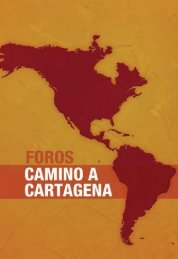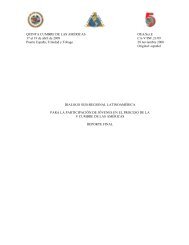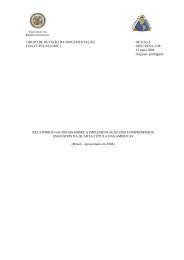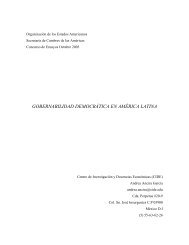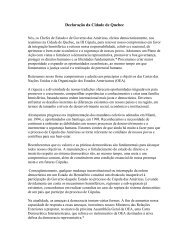The Road to Hemispheric Cooperation: Beyond the Cartagena
The Road to Hemispheric Cooperation: Beyond the Cartagena
The Road to Hemispheric Cooperation: Beyond the Cartagena
You also want an ePaper? Increase the reach of your titles
YUMPU automatically turns print PDFs into web optimized ePapers that Google loves.
institutions, values and practices consecrated in <strong>the</strong><br />
Charter, wherever <strong>the</strong>y might occur.<br />
This means that <strong>the</strong> secretary general or a member state,<br />
in <strong>the</strong> framework of Article 20 of <strong>the</strong> Charter, in coordination<br />
with <strong>the</strong> IACHR and without contravening its independence,<br />
would utilize <strong>the</strong> Commission or its Freedom<br />
of <strong>the</strong> Press Rapporteur’s reports <strong>to</strong> express <strong>the</strong>ir concern<br />
publicly in cases where violations of political rights<br />
or fundamental freedoms constitute or result from “an<br />
alteration of <strong>the</strong> constitutional regime.” Throughout <strong>the</strong><br />
years, <strong>the</strong> Commission’s reports have observed such<br />
violations in various member states, making explicit <strong>the</strong><br />
connection between democracy and <strong>the</strong> observance of<br />
human rights. 15<br />
According <strong>to</strong> Article 91(f) of <strong>the</strong> Founding OAS Charter,<br />
it is <strong>the</strong> Permanent Council’s responsibility “<strong>to</strong> consider<br />
<strong>the</strong> Commission’s reports and present <strong>to</strong> <strong>the</strong> General<br />
Assembly whatever observations and recommendations<br />
it may have.” Unfortunately, <strong>the</strong> council has not always<br />
exercised this responsibility fully, as it frequently fails <strong>to</strong><br />
examine <strong>the</strong> reports thoroughly in public sessions.<br />
Because of <strong>the</strong>ir independence, <strong>the</strong> IAHRC and <strong>the</strong> Rapporteur’s<br />
reports can be useful instruments <strong>to</strong> promote<br />
a public debate about presumed or proven violations of<br />
political rights and democratic institutions, values and<br />
practices—a debate that may prevent fur<strong>the</strong>r violations<br />
and possible interruption of <strong>the</strong> democratic order.<br />
Fur<strong>the</strong>rmore, appropriate utilization of <strong>the</strong> Commission’s<br />
reports would streng<strong>the</strong>n its role in protecting human and<br />
political rights in <strong>the</strong> hemisphere. In fact, bolstering <strong>the</strong> role<br />
of <strong>the</strong> IAHCR system has become imperative in view of <strong>the</strong><br />
recent politically motivated attacks it has received from <strong>the</strong><br />
governments of Bolivia, Brazil, Ecuador and Venezuela. 16<br />
3. Streng<strong>the</strong>n <strong>the</strong> Secretary General’s Missions<br />
A third possible action <strong>to</strong> fully apply <strong>the</strong> IADC and improve<br />
its effectiveness, without reforming it, would be<br />
<strong>to</strong> institutionalize and streng<strong>the</strong>n <strong>the</strong> secretary general’s<br />
missions of political observations and good offices.<br />
When a government requests <strong>the</strong> assistance of <strong>the</strong><br />
organization because it considers that its institutional<br />
order is being threatened by an emerging political crisis,<br />
as allowed in Article 18, <strong>the</strong> collective bodies normally<br />
would instruct <strong>the</strong> secretary general <strong>to</strong> send a political/<br />
diplomatic mission <strong>to</strong> analyze <strong>the</strong> situation and <strong>to</strong> offer<br />
its good offices <strong>to</strong> help preserve <strong>the</strong> democratic order<br />
and report <strong>to</strong> back <strong>to</strong> <strong>the</strong>m (Bolivia, 2005 and 2008; Ecuador,<br />
2005; Nicaragua, 2005 and 2008; Guatemala,<br />
2009; Honduras, 2009).<br />
<strong>The</strong> role of <strong>the</strong>se political missions is twofold. First, <strong>to</strong><br />
promote and facilitate political dialogue, negotiation and<br />
consensus building amongst <strong>the</strong> contending forces.<br />
Second, <strong>to</strong> observe, with appropriate follow-up, <strong>the</strong>ir<br />
compliance with <strong>the</strong> accords <strong>the</strong>y reached <strong>to</strong> preserve<br />
or res<strong>to</strong>re <strong>the</strong> democratic order.<br />
Because of <strong>the</strong>ir critical function, <strong>the</strong>se missions should<br />
be prepared <strong>to</strong> remain in <strong>the</strong> country long enough <strong>to</strong> generate<br />
confidence amongst <strong>the</strong> political forces, should be<br />
led by an OAS secretary general’s representative who<br />
is politically savvy and well-versed on <strong>the</strong> nature and<br />
his<strong>to</strong>ry of <strong>the</strong> inter-American system and <strong>the</strong> IADC, and<br />
should be well staffed with experts in negotiation and<br />
mediation. Recent missions of this type have not met all<br />
of <strong>the</strong>se requirements, as exemplified by <strong>the</strong> secretary<br />
general’s failed mission <strong>to</strong> support President Zelaya’s effort<br />
<strong>to</strong> hold a referendum.<br />
4. Support Technical <strong>Cooperation</strong>, Political Institutions<br />
and Democratic Governance<br />
A fourth way <strong>to</strong> improve <strong>the</strong> effectiveness of <strong>the</strong> IADC<br />
would be <strong>to</strong> adequately support, politically and financially,<br />
<strong>the</strong> implementation of technical cooperation programs<br />
designed <strong>to</strong> promote democratic values and<br />
practices, and also support <strong>the</strong> streng<strong>the</strong>ning of political<br />
institutions and democratic governance, as stated in<br />
Articles 26 and 27 of <strong>the</strong> Charter. Thus, member states<br />
and <strong>the</strong> secretary general should reinstate <strong>the</strong> medium<br />
and long-term democracy programs eliminated in 2005,<br />
which <strong>the</strong> now-defunct Unit for <strong>the</strong> Promotion of Democracy<br />
(UPD) had successfully implemented since 1992.<br />
Those programs, mandated by <strong>the</strong> governing bodies,<br />
included support for modernization and streng<strong>the</strong>ning of<br />
legislatures, elec<strong>to</strong>ral bodies, and political parties and<br />
local governments. <strong>The</strong>y also supported <strong>the</strong> promotion<br />
of democratic values and practices through <strong>the</strong> education<br />
system and training programs for young leaders.<br />
<strong>The</strong> <strong>Road</strong> <strong>to</strong> <strong>Hemispheric</strong> <strong>Cooperation</strong>: <strong>Beyond</strong> <strong>the</strong> <strong>Cartagena</strong> Summit of <strong>the</strong> Americas<br />
<strong>The</strong> Brookings Institution ❘ Latin America Initiative<br />
82



